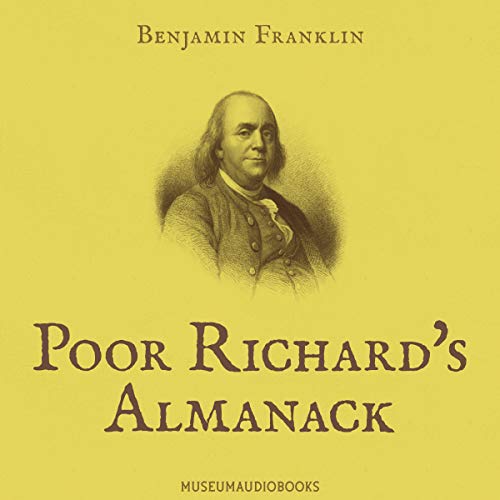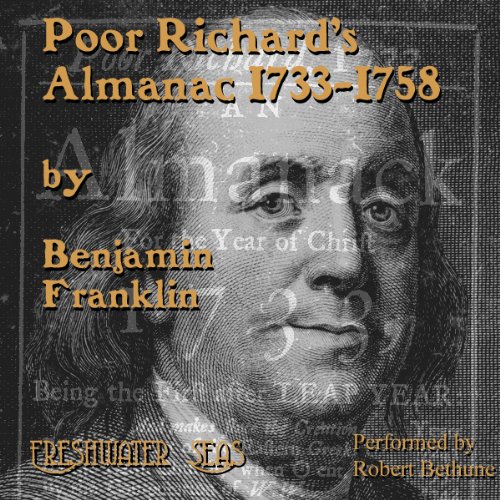-
Poor Richard's Almanack
Benjamin Franklin
Hardcover (Peter Pauper Press, June 1, 1980)A faithful reproduction of the original Peter Pauper Press edition of Poor Richard's Almanack, circa 1950, the current version contains the same colorful woodcuts and 18th century design of the original.Printed in hardcover on heavyweight paper stock, this is a great addition to any Franklin fan's collection.Includes hundreds of delightful aphorisms, carefully selected from many issues of Franklin's popular 18th-century publication.80 pages.Measures 6'' wide x 9-14'' high
-
Poor Richard's Almanack
Benjamin Franklin, Jacques Richey, MuseumAudiobooks.com
Audiobook (MuseumAudiobooks.com, Dec. 4, 2019)Poor Richard's Almanack is an almanac published annually from 1732 to 1758 by Benjamin Franklin, under the pseudonym of "Poor Richard" or "Richard Saunders". Almanacks were very popular in colonial America, usually offering a mixture of weather forecasts, practical household hints, puzzles, and other amusements. Poor Richard's Almanack contained the calendar, astronomical and astrological information, poems, and sayings. In the spaces that occurred between noted calendar days, Franklin included proverbial sentences about industry and frugality. Franklin also included the occasional mathematical exercise, and the 1750 Almanack features an early example of demographics. It is mainly remembered, however, for being a repository of Franklin's aphorisms and proverbs, many of which live on in American English.
-
Poor Richard's Almanac
Benjamin Franklin
eBook (, April 18, 2010)Benjamin Franklin's classic Poor Richard's Almanac is chiefly remembered for being a repository of Franklin's aphorisms and proverbs, many of which live on in and are commonly used today, and have been newly typeset and included in this edition. These maxims typically counsel thrift and courtesy, with a dash of cynicism. The orginal Almanac also included the calendar, weather, poems, and astronomical and astrological information that a typical almanac of the period would contain - those sections are typically of little interest to the modern reader and are not contained in this edition.
-
Poor Richard's Almanac
Benjamin Franklin, Robert Bethune, Freshwater Seas
Audiobook (Freshwater Seas, Oct. 10, 2011)The prefaces, proverbs, and poems of Benjamin Franklin, originally printed in editions of Poor Richard's Almanac for 1733 to 1758. As Benjamin Franklin himself put it: "Courteous Listener: Besides the astronomical Calculations, and other Things usually contain’d in Almanacks, which have their daily Use indeed while the Year continues, but then become of no Value, I have constantly interspers'd moral Sentences, prudent Maxims, and wise Sayings, many of them containing much good Sense in very few Words, and therefore apt to leave strong and lasting Impressions on the Memory of young Persons, whereby they may receive Benefit as long as they live, when both Almanack and Almanac-maker have been long thrown by and forgotten. If I now and then insert a Joke or two, that seem to have little in them, my Apology is, that such may have their Use, since perhaps for their Sake light airy Minds peruse the rest, and so are struck by somewhat of more Weight and Moment. The Verses on the Heads of the Months are also design'd to have the same Tendency. I need not tell thee that many of them are of my own Making. If thou hast any Judgment in Poetry, thou wilt easily discern the Workman from the Bungler. I know as well as thee, that I am no Poet born, and it is a Trade I never learnt, nor indeed could learn. If I make Verses 't is in Spight—Of Nature and my Stars, I write. Why then should I give my Readers bad Lines of my own, when good Ones of other Peoples are so plenty? 'T is methinks a poor Excuse for the bad Entertainment of Guests that the Food we set before them, tho' coarse and ordinary, is of one's own raising, off one’s own Plantation, [etc.] when there is Plenty of what is ten times better, to be had in the Market. On the contrary, I assure ye, my Friends, that I have procur'd the best I could for ye, and much good may it do ye. I am thy poor Friend, to serve thee, Richard Saunders." Since Ben Franklin would have been amazed at audiobooks, let these few details be added: unlike most editions of Poor Richard, this one includes essentially all of the text, not just the aphorisms and sayings. This gives you, Courteous Listener, a much better appreciation of how Franklin wrote and thought. In particular, you will find that the full body of the Poor Richard almanacs contains a great deal of religious and spiritual thought in which Franklin laid out and propounded his understanding of Christianity as it stood in his day. Last but not least, since a long parade of sayings, poems, etc., would be dull all strung together, this edition includes snippets of music between them, drawn from about four dozen Colonial-era tunes and imitating the sound of Colonial instruments such as flute, fife, lute, English guitar, music box, and harpsichord. May you enjoy it and draw benefit from it, as Ben himself would have wished!
-
Poor Richard's Almanack
Benjamin Franklin
Hardcover (Peter Pauper Press, June 1, 1980)A faithful reproduction of the original Peter Pauper Press edition of Poor Richard's Almanack, circa 1950, the current version contains the same colorful woodcuts and 18th century design of the original.Printed in hardcover on heavyweight paper stock, this is a great addition to any Franklin fan's collection.Includes hundreds of delightful aphorisms, carefully selected from many issues of Franklin's popular 18th-century publication.80 pages.Measures 6'' wide x 9-14'' high
-
Poor Richard's Almanack
Benjamin Franklin, Paul A. Volcker
eBook (Skyhorse, Nov. 17, 2007)Benjamin Franklin's classic book is full of timeless, thought-provoking insights that are as valuable today as they were over two centuries ago. With more than 700 pithy proverbs, Franklin lays out the rules everyone should live by and offers advice on such subjects as money, friendship, marriage, ethics, and human nature. They range from the famous "A penny saved is a penny earned" to the lesser-known but equally practical "When the wine enters, out goes the truth." Other truisms like "Fish and visitors stink after three days" combine sharp wit with wisdom. Paul Volcker's new introduction offers a fascinating perspective on Franklin's beloved work.
-
Poor Richard's Almanack
Benjamin Franklin
Paperback (CreateSpace Independent Publishing Platform, Dec. 12, 2013)If you like Poor Richard's Almanack By Benjamin Franklin, please see the original compilation titled:"Poor Richard's Almanack of Common Sense: An Original Compilation Consisting of Poor Richard's Almanack and Thomas Paine's Common Sense," by Benjamin Franklin & Thomas Pain (ISBN: 978-1642270068), https://www.amazon.com/Poor-Richards-Almanack-Common-Sense/dp/1642270067. Z+
Z+
-
Poor Richard's almanack
Benjamin Franklin
eBookPoor Richard's almanack (1914). 72 pages
-
Poor Richard's Almanack
Benjamin Franklin, Paul A. Volcker
Hardcover (Skyhorse Publishing, Nov. 17, 2007)Benjamin Franklin’s classic book is full of timeless, thought-provoking insights that are as valuable today as they were over two centuries ago. With more than 700 pithy proverbs, Franklin lays out the rules everyone should live by and offers advice on such subjects as money, friendship, marriage, ethics, and human nature. They range from the famous “A penny saved is a penny earned” to the lesser-known but equally practical “When the wine enters, out goes the truth.” Other truisms like “Fish and visitors stink after three days” combine sharp wit with wisdom. Paul Volcker’s new introduction offers a fascinating perspective on Franklin’s beloved work.
-
Wit and Wisdom from Poor Richard's Almanack
Benjamin Franklin
Paperback (Dover Publications, May 14, 1999)First published in 1732 by Benjamin Franklin when he was just 26, Poor Richard's Almanack was issued annually for the next 25 years. Extremely popular with readers of the day, the Almanack was a fascinating compilation of weather predictions, recipes, jokes, and delightful aphorisms — many representing Franklin's common-sense philosophy, and others, proverbs from the past.This handy little volume presents hundreds of these charming maxims, carefully selected from a number of Franklin's "almanacks." Arranged in nearly 30 categories (eating and drinking; men, women, and marriage; friendships; money and frugality; religion; professions and occupations, etc.), they include such familiar phrases as:Early to bed and early to rise, makes a man healthy, wealthy and wise.Haste makes waste.Love your Neighbour; yet don't pulldown your Hedge.He that lies down with Dogs, shall rise up with fleas.Hunger never saw bad bread.He's a Fool that makes his Doctor his Heir.He that has not got a Wife, is not yet a compleat Man.An ideal sourcebook for writers, public speakers, and students, this practical and entertaining little book will also delight general readers with its rich store of time-honored folk wisdom. Z+
Z+
-
Poor Richard's Almanack
Benjamin Franklin
Paperback (Forgotten Books, April 19, 2018)Excerpt from Poor Richard's AlmanackOpposite historic Old South Church in Boston, on January 6, 1706, was born Benjamin Franklin.Benjamin was the fifteenth child of Josiah Franklin, whose occupation was that of tallow-chandler or candle-maker. Business was not prosperous, and the Franklin family was reared in very hum ble circumstances.As a child, Benjamin hungered for books and knowledge. During the two years that his father was able to send him to school, he showed remarkable aptitude and industry, and rapidly outdistanced his fellow pupils.The first book which Franklin read was Bunyan's Pilgrim's Progress. By trad ing and borrowing, he managed to secure other volumes. His passion for reading was so intense that he attracted the at tention of a kind-hearted Boston mer chant, who gave the boy access to his well-stocked library. Franklin read only books which could add to his education, and read them with a thoroughness that extracted every bit of useful knowledge.About the PublisherForgotten Books publishes hundreds of thousands of rare and classic books. Find more at www.forgottenbooks.comThis book is a reproduction of an important historical work. Forgotten Books uses state-of-the-art technology to digitally reconstruct the work, preserving the original format whilst repairing imperfections present in the aged copy. In rare cases, an imperfection in the original, such as a blemish or missing page, may be replicated in our edition. We do, however, repair the vast majority of imperfections successfully; any imperfections that remain are intentionally left to preserve the state of such historical works. Z+
Z+
-
Poor Richard's Almanack
Benjamin Franklin
Paperback (Martino Fine Books, Nov. 21, 2018)2018 Reprint of 1937 Edition. Full facsimile of the original edition, not reproduced with Optical Recognition software. A Reprint of the Peter Pauper Pressedition of Franklin’s classic work with dozens of charming woodcuts. Franklin, the American inventor, statesman, and publisher, achieved success with Poor Richard's Almanack. Almanacks were very popular books in colonial America, offering a mixture of seasonal weather forecasts, practical household hints, puzzles, and other amusements. Poor Richard's Almanack was also popular for its extensive use of wordplay, and some of the witty phrases coined in the work survive in the contemporary American vernacular. The Almanacks were published yearly and contained the calendar, weather, poems, sayings and astronomical information that a typical almanac of the period would contain. Franklin also included the occasional mathematical exercise, and the Almanack from 1750 features an early example of demographics. It is chiefly remembered, however, for being a repository of Franklin's aphorisms and proverbs, many of which live on in American English. These maxims typically counsel thrift and courtesy, with a dash of cynicism.